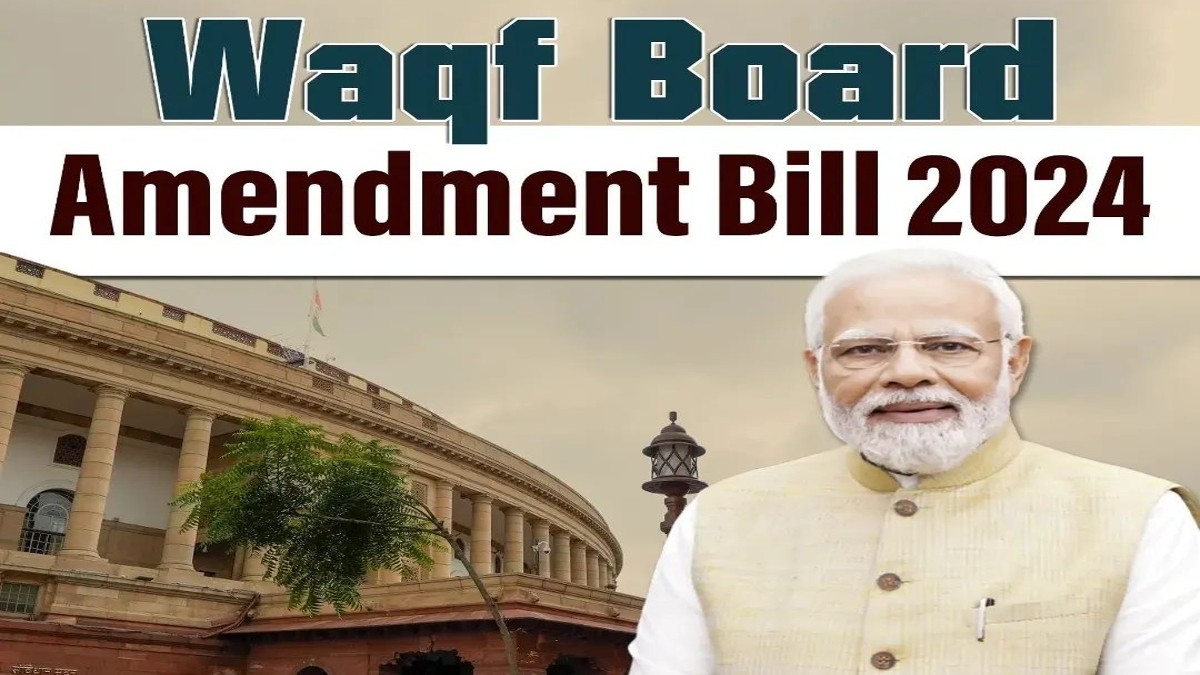Waqf Board Amendment Bill
The Waqf Board Amendment Bill, 2024, represents a significant legislative development in India’s socio-religious landscape. Waqf, an Islamic endowment of property or funds for religious or charitable purposes, has been a crucial aspect of Islamic culture and society in India for centuries. T
he Waqf Boards, established under the Waqf Act, 1995, have been responsible for the administration of these endowments. However, the system has long been criticized for inefficiency, corruption, and mismanagement. The Waqf Board Amendment Bill, 2024, seeks to address these issues by introducing comprehensive reforms aimed at enhancing transparency, accountability, and efficiency in the management of Waqf properties.
Historical Context of Waqf in India
Waqf, as a religious institution, has been an integral part of Islamic society since the early days of Islam. The concept involves the dedication of property or funds for religious or charitable purposes, ensuring the benefits are perpetually available to the community. In India, the institution of Waqf dates back to the medieval period, with numerous properties being endowed by rulers, nobles, and commoners alike. These properties were intended to support mosques, educational institutions, orphanages, and other charitable endeavors.
The British colonial administration recognized the importance of Waqf and enacted the Mussalman Waqf Validating Act in 1913, which provided legal recognition to Waqf properties. Post-independence, the Waqf Act of 1954 was introduced to consolidate and reform the administration of Waqf properties. This was followed by the Waqf Act of 1995, which aimed to further streamline the management of Waqf assets by establishing state-level Waqf Boards.
However, despite these legislative efforts, the administration of Waqf properties has been plagued by allegations of corruption, mismanagement, and inefficiency. There have been numerous instances of Waqf properties being illegally occupied, encroached upon, or sold off, leading to a significant loss of assets meant for the welfare of the community. The Waqf Board Amendment Bill, 2024, is an attempt to address these longstanding issues.
Key Provisions of the Waqf Board Amendment Bill, 2024
The Waqf Board Amendment Bill, 2024, introduces several key provisions aimed at improving the management and administration of Waqf properties. Some of the most significant changes include:
- Strengthening of Waqf Boards: The bill proposes to enhance the powers and autonomy of state Waqf Boards. It seeks to ensure that these boards are adequately staffed with professionals, including legal and financial experts, to improve their efficiency in managing Waqf properties. The bill also mandates regular audits of Waqf Boards to ensure transparency and accountability.
- Digitalization of Waqf Records: One of the major reforms proposed in the bill is the digitalization of all Waqf records. This includes the creation of a centralized database of Waqf properties across the country, accessible to the public. The move is expected to prevent illegal encroachments, ensure accurate record-keeping, and enhance transparency in the management of Waqf assets.
- Dispute Resolution Mechanism: The bill introduces a streamlined dispute resolution mechanism for resolving conflicts related to Waqf properties. It proposes the establishment of Waqf Tribunals with the authority to adjudicate disputes in a timely and efficient manner. This is aimed at reducing the backlog of Waqf-related cases in the regular judiciary and ensuring quicker resolution of disputes.
- Prohibition on Sale and Transfer of Waqf Properties: The bill reinforces the prohibition on the sale or transfer of Waqf properties without the prior approval of the Waqf Board and the state government. It also introduces stringent penalties for those found guilty of illegally selling or transferring Waqf assets.
- Enhanced Role of Central Waqf Council: The bill seeks to strengthen the role of the Central Waqf Council by granting it more oversight powers over state Waqf Boards. The council will be responsible for monitoring the functioning of state boards, ensuring compliance with the law, and providing necessary guidance and support.
- Increased Accountability and Transparency: The bill mandates that Waqf Boards publish their annual reports, including financial statements, online. This measure is intended to increase transparency and allow public scrutiny of the functioning of Waqf Boards.
Debates and Controversies
The Waqf Board Amendment Bill, 2024, has sparked considerable debate and controversy. While the bill has been lauded by some for its potential to reform the management of Waqf properties, others have raised concerns about certain provisions and the broader implications of the bill.
- Concerns About Autonomy: Critics of the bill argue that the increased oversight powers granted to the Central Waqf Council may undermine the autonomy of state Waqf Boards. They contend that this could lead to excessive centralization and political interference in the management of Waqf properties. Proponents of the bill, however, argue that such oversight is necessary to ensure uniformity and prevent mismanagement.
- Fear of Dispossession: Some community leaders have expressed concerns that the digitalization of Waqf records and the creation of a centralized database could lead to the dispossession of Waqf properties. They fear that inaccuracies in record-keeping or manipulation of data could result in the loss of Waqf assets. The government has sought to allay these fears by promising robust safeguards and transparency measures.
- Legal Challenges: The provision for the establishment of Waqf Tribunals has also faced criticism, with some legal experts arguing that it could lead to jurisdictional conflicts with the regular judiciary. There are concerns that the tribunals may lack the necessary expertise and resources to handle complex Waqf-related disputes.
- Impact on Communities: The bill has also been scrutinized for its potential impact on the Muslim community, which relies heavily on Waqf properties for religious, educational, and charitable purposes. Some community members worry that the reforms may disrupt the functioning of Waqf institutions and affect the availability of services provided through Waqf endowments.
Political Reactions
The Waqf Board Amendment Bill, 2024, has elicited varied reactions from different political parties and leaders. The ruling government has defended the bill as a necessary reform to protect and preserve Waqf properties and to ensure that they are used for the intended charitable purposes. The government has emphasized that the bill is aimed at curbing corruption and inefficiency in Waqf administration and that it will ultimately benefit the Muslim community.
Opposition parties, however, have criticized the bill, accusing the government of using it as a tool to exert greater control over Waqf properties. Some opposition leaders have argued that the bill does not adequately address the concerns of the community and could lead to further marginalization of Muslims. They have called for wider consultations and amendments to the bill to ensure that it genuinely serves the interests of the Waqf system and the community.
The Role of Waqf in Contemporary India
To understand the significance of the Waqf Board Amendment Bill, 2024, it is essential to recognize the role that Waqf plays in contemporary India. Waqf properties constitute a substantial portion of land and assets across the country, and they have historically been used to fund a wide range of religious, educational, and charitable activities.
Waqf institutions provide crucial services to the Muslim community, including the maintenance of mosques, the provision of scholarships for students, support for orphanages, and the funding of healthcare facilities. The effective management of Waqf properties is therefore vital for the well-being of the community and the preservation of its religious and cultural heritage.
However, the Waqf system in India has faced numerous challenges over the years, including illegal encroachments, fraudulent sales, and mismanagement of assets. These issues have eroded public trust in Waqf Boards and have led to significant losses in terms of both property and revenue. The Waqf Board Amendment Bill, 2024, seeks to address these challenges and ensure that Waqf properties are protected and used effectively for their intended purposes.
Potential Impact of the Bill
The Waqf Board Amendment Bill, 2024, has the potential to bring about significant changes in the administration of Waqf properties in India. If implemented effectively, the bill could lead to greater transparency, accountability, and efficiency in the management of Waqf assets. The digitalization of records and the establishment of a centralized database could help prevent illegal encroachments and ensure that Waqf properties are accurately documented and protected.
The enhanced role of the Central Waqf Council and the establishment of Waqf Tribunals could lead to better oversight and quicker resolution of disputes, thereby improving the overall functioning of Waqf Boards. The prohibition on the sale and transfer of Waqf properties, coupled with stringent penalties for violations, could help safeguard these assets from illegal transactions.
However, the success of the bill will depend on its implementation. The government will need to ensure that the reforms are carried out in a transparent and fair manner, with adequate safeguards to protect the interests of the Waqf system and the Muslim community. It will also be important to address the concerns raised by critics and to make necessary adjustments to the bill to ensure that it achieves its intended objectives.
Conclusion
The Waqf Board Amendment Bill, 2024, represents a pivotal step toward reforming the administration of Waqf properties in India, aiming to address long-standing issues of mismanagement, corruption, and inefficiency. By enhancing transparency through digitalization, strengthening the autonomy and accountability of Waqf Boards, and introducing new mechanisms for dispute resolution, the bill seeks to protect and preserve the valuable assets dedicated to religious and charitable purposes within the Muslim community.
However, the bill also raises significant concerns about potential over-centralization, the risk of dispossession, and the broader implications for the autonomy of state Waqf Boards. The political and social debates surrounding the bill underscore the need for careful implementation and continuous dialogue with stakeholders to ensure that the reforms truly serve the intended purpose of safeguarding Waqf properties and benefiting the community.
Ultimately, the success of the Waqf Board Amendment Bill, 2024, will depend on its execution and the ability of the government to balance the need for reform with the protection of the rights and interests of the Waqf system and the communities it serves. If effectively implemented, the bill could mark a significant improvement in the management of Waqf assets, ensuring that they continue to fulfill their intended charitable and religious functions in a just and transparent manner.


















I found this article to be very eye-opening. Thanks for sharing.